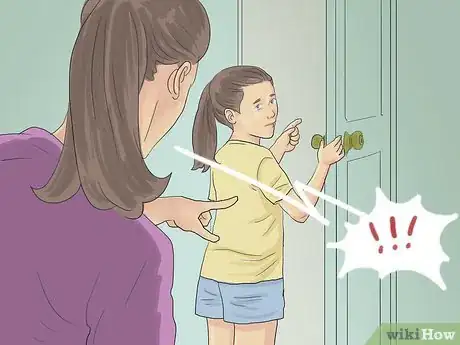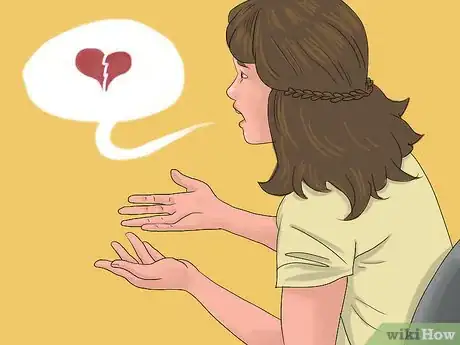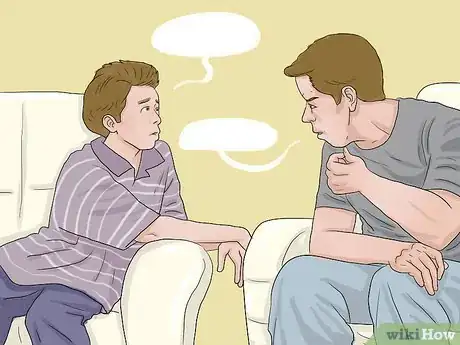This article was co-authored by Jin S. Kim, MA. Jin Kim is a Licensed Marriage and Family Therapist based out of Los Angeles, California. Jin specializes in working with LGBTQ individuals, people of color, and those that may have challenges related to reconciling multiple and intersectional identities. Jin received his Masters in Clinical Psychology from Antioch University Los Angeles, with a specialization in LGBT-Affirming Psychology, in 2015.
There are 9 references cited in this article, which can be found at the bottom of the page.
This article has been viewed 27,247 times.
Everyone argues from time to time. When disagreements are respectful and calm, they are a healthy and productive way of solving problems. When parents fight, though, it can be very traumatic for children - especially if the parents fight in front of or about their children. Being exposed to your parents fighting can create unhealthy standards for children about what kind of behavior in a relationship is appropriate.[1] Witnessing your parents fighting can also lead to anxiety and other emotional/psychological problems later in life.[2] If your divorced parents are still fighting, there are steps you can take to make the situation somewhat easier to live with.
Steps
Staying Out of The Fight
-
1Let your parents know you wish to remain neutral. Sometimes parents will try to drag their children into the fight in the midst of an argument. They may not realize it, but this is incredibly unfair and can actually be damaging to the children.
If your parents try to involve you in their fight, let them know that you love them both and want to remain neutral.[3]- You can say something like, "I love you both, and this fight is between you two. I don't feel comfortable choosing sides."
- Don't let your parents drag you into their conflicts or force you to get involved.
- If your parents want you to relay messages between them, for example, let them know that you're not comfortable doing this and tell them to talk to each other.
-
2Leave the room when your parents start fighting. If you're old enough to leave the house unsupervised, going for a walk when your parents start to fight can be a good way to escape from the stress and frustration that follows.
If you're too young to leave the house unsupervised, you can retreat to your bedroom or go out into the yard to be alone for a while until your parents are finished arguing.[4]- Going for a walk around the block, walking to the park, or even going into your room are all healthy ways of staying away from your parents when they fight.
- Once you're away from the fight, take slow, deep breaths to help you calm down.
- If you leave the house, let your parents know where you're going. You may also want to give a short explanation of why you're going for a walk, such as, "I just can't be here when you two fight."
Advertisement -
3Try to protect younger siblings from the fighting. If you have any siblings younger than you, the sound of your parents fighting may be even more traumatic or frightening for them.
Any time your parents start to argue or yell, try to get your sibling(s) out of the house. Go for a walk together, or take your siblings to a movie or to a friend's house.- Talk to your siblings about how you feel when your parents fight, and ask them how the fighting affects them.[5]
- Let your siblings know that you are there for them, and that you will help keep them safe as best you can.
-
4Get help during physical arguments. Some types of fighting that stem from simple disagreements are considered "healthy" fighting. These are usually minor in nature and can easily be resolved. Concerning fighting, which usually involves yelling, name calling, or being disrespectful or demeaning to the other person, can potentially lead to physical arguments.[6]
- If your parents threaten to hurt one another, destroy property (dishes, furniture, etc), or engage in any kind of physical acts of violence, call the police immediately.
- If you do not feel safe calling the police, call a trusted adult (ideally a close relative or friend of the family) right away and tell him or her what happened.
-
5Escape from prolonged fights. If your parents have been fighting on and off every time they see or talk to each other, it can create a tense or even scary environment at home. This may cause you to feel unsafe or insecure.
If this happens, staying at a friend or family member's home for a brief period can help make things easier on you and/or your siblings until things calm down at home.- Wait until your parents are calm and/or in a neutral space outside the house.[7]
- Let your parents know how their fighting has been affecting you. Do so calmly and without placing any blame.
- Ask if you (and your siblings, if you have any) can stay with a close relative or a good friend for a few days until things are more stable at home. If your parents agree, make sure it's okay with that relative or that friend's parents before you go to stay with them.
- Encourage your parents to try and work through some of their issues while you're gone. Seeing you need to leave the house might make them realize how bad their fighting has gotten.
-
6Urge your parents to talk to a therapist. If your parents' fighting is causing you a lot of anxiety and grief, you may want to urge your parents to seek counseling. This should not be your first course of action; rather, you should try urging your parents to see a counselor if they've proven unwilling or unable to stop fighting in front of you.
A counselor or therapist can help your parents work through their problems behind closed doors and in a safe, neutral space that won't expose you to their problems.[8]- Even though your parents are divorced, they may still be able to come together for therapy sessions if they know how much their fighting is affecting you.
- A couples counselor or therapist can help your parents address their problems and work through those issues in a time and place that won't affect you.
- Let your parents know that they can find information about couples or individual therapy online or in your local phone book.
- If your parents aren't willing to consider seeing a therapist together, you should urge them both to individually see therapists so that they can work through their problems and find healthier ways of communicating.
Coping with Your Feelings
-
1Express your emotions as much as you need to. Some children may feel like they're not "allowed" to show emotion or get upset when their parents are getting divorced or have recently separated. This may come from feeling like it's your job to keep your parents happy.
However, you need to remember that it isn't your job to take care of your parents; they should be taking care of you. If you feel like you need to express your emotions, you should do so in a safe, productive way.[9]- Crying, feeling sad or angry, or even yelling are all safe ways of expressing how you feel.
- Being destructive is never okay. You can express your emotions, but that doesn't mean you can hurt others or destroy their property.
- If you're having a hard time coping with your emotions, try seeing a school therapist. You can also let your parents know how you feel and ask if you can talk things through with them.
-
2Keep a journal to write about or draw your feelings. Journaling is a great way to work through difficult emotions. Your journal should be a private notebook that no one else will read. Because it's private, you should feel safe writing or drawing out whatever you're thinking and feeling as you work through this difficult situation with your parents.[10]
-
3Try talking to your parents. If your parents have gone through a really difficult divorce, you may feel intimidated talking to them about your feelings about the situation. However, if their fighting is affecting you, you have every right to politely voice your concerns to your parents.[11]
- Be respectful when you bring it up. Try saying something like, "I know things have been difficult for everyone, but it makes things a lot harder for me when you two fight."
- Ask your parents to avoid fighting in front of you. At the very least, you can ask that they avoid saying negative things about each other to you or in front of you.[12]
- Remind your parents that you love them both, and that you need to feel loved and supported by both of them as well.
-
4Talk to a school therapist or other trusted adult. If things are really difficult at home, you may have a hard time talking to your parents about their fighting. If this is the case, you should feel safe talking to a trusted adult.
Many schools have therapists and counselors available for these situations. Even if your school doesn't offer counselors, you should be able to talk to a trusted aunt or uncle, grandparent, or even a teacher about what you're going through.[13]- Whichever adult you choose to talk to about your parents' fighting, let that individual know that you care about both parents and just want them to stop fighting.
- If either parent or both parents have physically hurt you in any way, let the adult you talk to know about it. However, if your parents have not physically harmed you, let the adult know that you feel safe, just sad about your parents fighting all the time.
-
5Call a help hotline for advice or someone to listen. If you aren't comfortable talking to an adult or don't have anyone you can confide in, you might want to try calling a help hotline. There are special hotlines just for kids whose parents create scary or sad living situations with their constant fighting.
For example, you can call the National Runaway Safeline any time, 24 hours a day. Their phone number is 1-800-RUNAWAY.
Working Through Your Parents' Divorce
-
1Try to remain flexible. Even if your parents divorced a while ago, it can still be difficult to adjust to splitting your time between them. That adjustment can be even more difficult if your parents fight a lot whenever you're around. One parent may even live out of town, which may require you to travel some distance in order to visit.
Just remember that the stress and confusion that happens when your regular routine is interrupted is usually a short-term problem. Your parents will find ways of making the transition easier for you, and eventually you'll adjust to your new schedule.[14]- Traveling to see one of your parents can be stressful. However, if you use that car time to talk, it can become quality time spent with either or both parents.
- Your daily and weekly routines will likely be a bit shaken up for a while, at least until things settle down. Try to be patient and know that these disturbances are often temporary.
- There's a chance that your parents may not be able to afford the same things they could afford when they were both living together. However, your parents will still do everything they can to care for and provide for you.
-
2Keep doing the things you enjoy. Even though there's no way your parents' divorce won't affect you, it's important to keep living your own life and doing the things you love.[15] This can help you maintain some normalcy and a sense of identity as your parents' relationship fluctuates.
You may not be able to control where you are all the time, but you can make choices regarding how you spend your free time when you're not in school or doing homework.[16]- If you're really having a hard time coping with things, try taking up a new hobby. Learning something new and exciting may be just what you need to stay focused on something outside of your parents' problems.
- You can even get your parents involved in your hobbies and activities. That way you'll be able to enjoy some quality time with each parent, no matter whom you're visiting with at the time.
-
3Stay in touch with the parent you see less often. One of the hardest parts of having divorced parents is seeing one parent less often.
If your parents are fighting, or if they try to force you to choose sides in their fight, not seeing both parents every day can be even more stressful. If at all possible, try letting the parent you're not with know that you love and miss him or her from time to time.[17]- A short phone call, text, or email every once in a while can help ease both of your feelings of sadness and loneliness.
- You don't have to say much if you're not sure what to say. A simple, "Hi, just wanted you to know I'm thinking of you" would suffice.
- Ask for permission before you call, text, or email your parent, as some parents may have rules about using the phone or computer unsupervised. Depending on the terms of your parents' divorce, there may also be restrictions on how and when one parent can communicate with you.
Expert Q&A
-
QuestionWhat should I do if my mom and dad are fighting?
 Jin S. Kim, MAJin Kim is a Licensed Marriage and Family Therapist based out of Los Angeles, California. Jin specializes in working with LGBTQ individuals, people of color, and those that may have challenges related to reconciling multiple and intersectional identities. Jin received his Masters in Clinical Psychology from Antioch University Los Angeles, with a specialization in LGBT-Affirming Psychology, in 2015.
Jin S. Kim, MAJin Kim is a Licensed Marriage and Family Therapist based out of Los Angeles, California. Jin specializes in working with LGBTQ individuals, people of color, and those that may have challenges related to reconciling multiple and intersectional identities. Jin received his Masters in Clinical Psychology from Antioch University Los Angeles, with a specialization in LGBT-Affirming Psychology, in 2015.
Licensed Marriage & Family Therapist If you're comfortable with it, tell them it makes you uncomfortable or upset. They may pull back if they realize they're upsetting you. If you aren't comfortable with that, no worries. Simply remove yourself from the situation and find a safe place to wait them out. You can't control your parents' behavior, so don't beat yourself up over it.
If you're comfortable with it, tell them it makes you uncomfortable or upset. They may pull back if they realize they're upsetting you. If you aren't comfortable with that, no worries. Simply remove yourself from the situation and find a safe place to wait them out. You can't control your parents' behavior, so don't beat yourself up over it. -
QuestionWhy do I feel bad when my parents fight?
 Jin S. Kim, MAJin Kim is a Licensed Marriage and Family Therapist based out of Los Angeles, California. Jin specializes in working with LGBTQ individuals, people of color, and those that may have challenges related to reconciling multiple and intersectional identities. Jin received his Masters in Clinical Psychology from Antioch University Los Angeles, with a specialization in LGBT-Affirming Psychology, in 2015.
Jin S. Kim, MAJin Kim is a Licensed Marriage and Family Therapist based out of Los Angeles, California. Jin specializes in working with LGBTQ individuals, people of color, and those that may have challenges related to reconciling multiple and intersectional identities. Jin received his Masters in Clinical Psychology from Antioch University Los Angeles, with a specialization in LGBT-Affirming Psychology, in 2015.
Licensed Marriage & Family Therapist It's naturally upsetting to see your parents fight. I know it's hard, but it's important to recognize that this has nothing to do with you. You haven't done anything wrong. Your parents' fighting is entirely about their problems.
It's naturally upsetting to see your parents fight. I know it's hard, but it's important to recognize that this has nothing to do with you. You haven't done anything wrong. Your parents' fighting is entirely about their problems.
References
- ↑ https://www.psychologytoday.com/blog/contemplating-divorce/200911/divorce-doesnt-harm-children-parents-fighting-harms-child
- ↑ https://www.psychologytoday.com/blog/domestic-intelligence/201304/is-arguing-really-bad-the-children
- ↑ http://www.parents.com/parenting/relationships/sex-and-marriage-after-baby/how-to-fight-in-front-of-your-kids/
- ↑ http://kidshealth.org/en/kids/family-fights.html#
- ↑ http://us.reachout.com/facts/factsheet/when-your-parents-break-up
- ↑ http://us.reachout.com/facts/factsheet/when-your-parents-break-up
- ↑ http://us.reachout.com/facts/factsheet/when-your-parents-break-up
- ↑ Jin S. Kim, MA. Licensed Marriage & Family Therapist. Expert Interview. 14 May 2019.
- ↑ http://www.nimh.nih.gov/health/publications/helping-children-and-adolescents-cope-with-violence-and-disasters-parents-trifold/index.shtml
- ↑ http://www.nimh.nih.gov/health/publications/helping-children-and-adolescents-cope-with-violence-and-disasters-parents-trifold/index.shtml
- ↑ http://familydoctor.org/familydoctor/en/kids/family-friends/when-parents-fight.html
- ↑ http://kidshealth.org/en/teens/divorce.html#
- ↑ Jin S. Kim, MA. Licensed Marriage & Family Therapist. Expert Interview. 14 May 2019.
- ↑ http://kidshealth.org/en/teens/divorce.html#
- ↑ Jin S. Kim, MA. Licensed Marriage & Family Therapist. Expert Interview. 14 May 2019.
- ↑ http://kidshealth.org/en/teens/divorce.html#
- ↑ http://kidshealth.org/en/teens/divorce.html#




































































